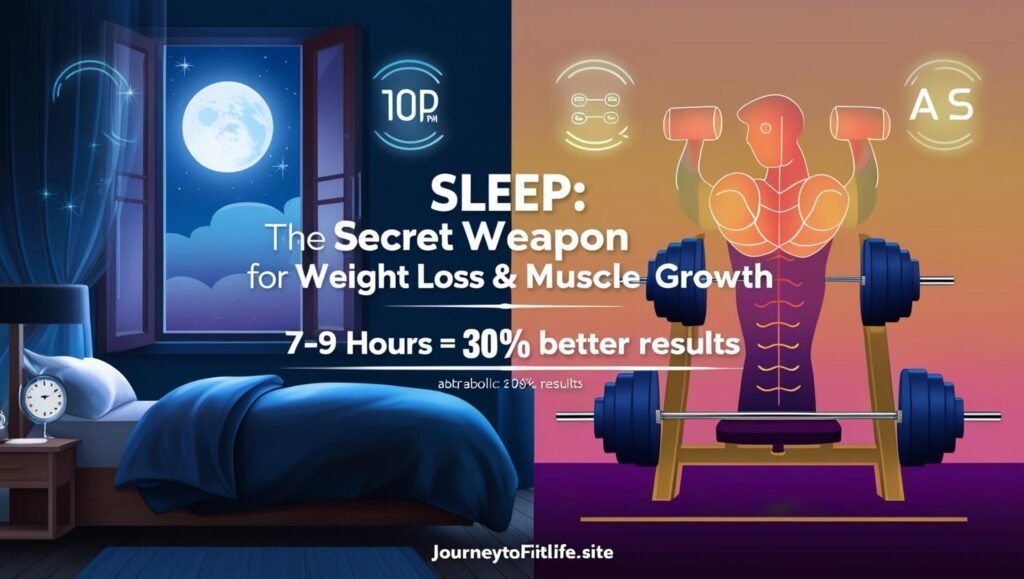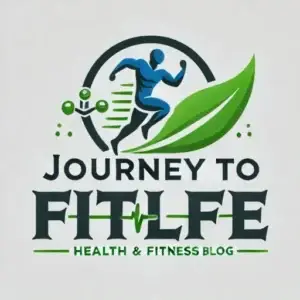
Introduction: The Overlooked Power of Sleep in Fitness
Sleep isn’t just about feeling rested—it’s a biological powerhouse for weight loss and muscle repair. While diets and workouts dominate fitness conversations, research shows poor sleep increases obesity risk by 55% and reduces muscle growth by 60%. This guide dives into the science of sleep’s role in fitness and provides actionable strategies to harness its benefits.
Sleep and Weight Loss: Hormones, Cravings, and Metabolism
1. Hormonal Havoc: Ghrelin vs. Leptin
Sleep deprivation disrupts two key appetite-regulating hormones:
- Ghrelin (Hunger Hormone): Rises by 24% with poor sleep, triggering cravings for high-calorie foods.
- Leptin (Satiety Hormone): Drops by 18%, making you feel unsatisfied after meals.
A PMC study found sleep-restricted individuals consumed 300+ extra calories daily, often from sugary snacks. Use our Calorie Calculator to track intake and avoid overeating.
2. Metabolic Slowdown
Poor sleep reduces insulin sensitivity, increasing fat storage and obesity risk. Adults sleeping <6 hours nightly have a 12% higher BMI over six years. Calculate your metabolic needs with our BMR/TDEE Calculator.
3. Sleep Duration Matters
- 7–9 Hours: Optimal for fat loss. A study showed extending sleep to 8.5 hours reduced daily calories by 270 kcal.
- <6 Hours: Linked to 55% higher obesity risk.
Action Step: Pair quality sleep with our 7-Day Healthy Meal Plan to curb late-night snacking.
Sleep and Muscle Recovery: Growth, Repair, and Performance
1. Growth Hormone Release
During deep sleep, 70% of human growth hormone (HGH) is released, repairing muscle fibers damaged during workouts. Athletes sleeping 9–10 hours nightly gain muscle 2x faster than those sleeping 6 hours (Bodyset).
2. Glycogen Replenishment
Sleep restores muscle glycogen, your body’s primary energy source. Low glycogen levels lead to fatigue and poor workout performance. Track your fitness progress with our Body Fat Percentage Calculator.
3. Inflammation Reduction
Anti-inflammatory cytokines released during sleep accelerate recovery. A PMC study found proper sleep reduces post-workout soreness by 30%.
| Aspect | Impact of Sleep | Tool to Track |
|---|---|---|
| Muscle Repair | HGH release during deep sleep | Lean Body Mass Calculator |
| Energy Restoration | Replenishes glycogen stores | Target Heart Rate Calculator |
| Injury Prevention | Reduces inflammation and soreness | Waist-to-Hip Ratio Calculator |
5 Science-Backed Sleep Strategies for Fitness
- Prioritize Consistency
- Sleep and wake at the same time daily, even on weekends. Irregular schedules disrupt circadian rhythms.
- Optimize Your Environment
- Temperature: 60–67°F (15–19°C) ideal for deep sleep.
- Darkness: Use blackout curtains to block light.
- Fuel Smart Before Bed
- Avoid caffeine after 2 PM and heavy meals 3 hours before bed. Try sleep-friendly snacks from our Best Foods for Fat Loss guide.
- Wind Down with Yoga or Stretching
- Evening yoga improves sleep quality by 35% (International Yoga Day Guide).
- Track Your Progress
- Use our Hydration Calculator—dehydration disrupts sleep.
Common Myths Debunked
- “I’ll Lose Weight Faster by Skipping Sleep”: Sleep deprivation slows metabolism and increases fat storage.
- “Muscle Recovery Only Needs Protein”: Without sleep, protein synthesis drops by 18% (Study).
- “Alcohol Helps Sleep”: It disrupts REM cycles, impairing recovery.
For more myth-busting, read 5 Weight Loss Myths You Need to Stop Believing.
FAQs
Q: Can napping compensate for poor nighttime sleep?
A: Short naps (20–30 mins) help, but nighttime deep sleep is irreplaceable for HGH release.
Q: How does sleep affect workout performance?
A: Poor sleep reduces strength by 20% and endurance by 30%. Follow our Full-Body Workout Routine for efficient training.
Q: Does sleep affect hydration?
A: Yes! Use our Hydration Calculator to balance fluids.
Conclusion: Sleep Your Way to Fitness Success
Sleep is the ultimate performance enhancer. By prioritizing 7–9 hours nightly, you’ll curb cravings, boost metabolism, and accelerate muscle recovery. Pair quality rest with our Strength Training Guide and Cardio vs. Strength Training Comparison for maximum results.
Key Citations:
- Sleep Deprivation and Obesity (PMC)
- HGH and Muscle Repair (Wikipedia)
- Sleep Stages and Recovery (Wikipedia)
Start optimizing your sleep today—your fitness journey depends on it! 💤🏋️♂️

3 Responses